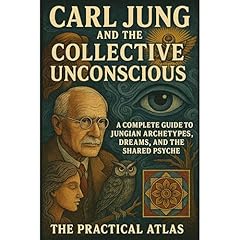
Psychology of the Unconscious
A Study of the Transformations and Symbolisms of the Libido
No se pudo agregar al carrito
Add to Cart failed.
Error al Agregar a Lista de Deseos.
Error al eliminar de la lista de deseos.
Error al añadir a tu biblioteca
Error al seguir el podcast
Error al dejar de seguir el podcast
 Exclusivo para miembros Prime: ¿Nuevo en Audible? Obtén 2 audiolibros gratis con tu prueba.
Exclusivo para miembros Prime: ¿Nuevo en Audible? Obtén 2 audiolibros gratis con tu prueba.Compra ahora por $24.28
-
Narrado por:
-
Martyn Swain
-
De:
-
Carl Jung
Published first in 1912, Psychology of the Unconscious was one of the most important stepping stones in the development of Jung’s thought and practice. It has a long subtitle: A Study of the Transformations and Symbolisms of the Libido. A Contribution to the History of the Evolution of Thought. This expressed the underlying impetus - a break from the view of the libido and its functions as taught by Sigmund Freud, which Jung had earlier adopted. It was from this point that the two approaches, which came to be known as the Swiss and Viennese schools, emerged.
As Jung’s translator, Beatrice M Hinkle, writes in her preface: ‘In this work Jung has plunged boldly into the treacherous sea of mythology and folklore, the productions of the ancient mind and that of the common people, and turned upon this vast material the same scientific and painstaking method of psychologic analysis that is applied to the modern mind, in order to reveal the common bond of desire and longing which unites all humanity, and thus bridge the gaps presumed to exist between ancient and widely separated peoples and those of our modern time.’
Jung bases the work on the Miller Fantasies, a collection of writings and poems written by an American woman, Frank Miller, published by another Swiss psychologist. Jung looked at these fantasies, tracing their mythological and cultural influences and inferences, religious, sexual, literary and emotional. The range is enormously wide as he refers to different world traditions including Christian, Mithraic, Judaic and Greek religious traditions; he quotes poetry ranging from Goethe and Hölderlin to Longfellow and even Rostand’s Cyrano de Bergerac makes an appearance.
Epics abound, from Gilgamesh to the Ramayana, the Rig Veda and the Egyptian Book of the Dead. Sexual attitudes and practices are discussed in terms of the Miller fantasies as well, covering the mores of different societies, including incest, violence and sexual assault.
It is a rich and challenging text in which analyses of magic and myth abound. Divided into two parts, it discusses diverse topics in 'Concerning the Two Kinds of Thinking' and 'The Hymn of Creation in Part I'. And in Part II, it goes on to explore 'Aspects of the Libido', 'The Transformation of the Libido', the 'Unconscious Origin of the Hero', 'The Symbolism of the Mother and of Rebirth' and 'The Sacrifice'. It opens with an introduction in which Jung, referring to Freud’s Interpretation of Dreams, discusses the relation of the incest fantasy to the Oedipus legend - and argues that it is necessary to delve further into historical material to understand individual analysis more fully. So, right from the start, Carl Gustav Jung goes down the path that was to make his investigation into the mind and its processes so distinct.
This rich and broadly encompassing text is skilfully presented by Martyn Swain.
PLEASE NOTE: When you purchase this title, the accompanying PDF will be available in your Audible Library along with the audio.
Public Domain (P)2020 Ukemi Productions LtdLos oyentes también disfrutaron:




















Las personas que vieron esto también vieron:


















The experience is akin to navigating a raw, unfiltered stream of consciousness, where profound insights emerge from a labyrinth of interwoven symbolic associations. One senses a deep immersion in the psychological terrain from which the concepts of Christianity arose, offering a unique perspective on the genesis of religious archetypes. The text's value lies not solely in its explicit conclusions, but in the raw, generative process it reveals. It serves as a crucial, if demanding, foundation for understanding the later, more refined articulations of the author's theories. Viewing this work as a primordial crucible of nascent ideas, rather than a polished treatise, allows for a deeper appreciation of its contribution to the development of his psychological framework. The reader is ultimately rewarded with a richer understanding of the psychological underpinnings of religious symbolism, even if the journey is fraught with intellectual rigor and occasional moments of perceived obscurity.
Striking amalgamation of myths and sick mind's fantasy
Se ha producido un error. Vuelve a intentarlo dentro de unos minutos.
Some chapters are repeated, some times there are long sections without sound at all. and some times the narrator repeats sections in different takes.
bad editing, double chapters long stretches of silence
Se ha producido un error. Vuelve a intentarlo dentro de unos minutos.
Incomprehensible with a rational mindset
Se ha producido un error. Vuelve a intentarlo dentro de unos minutos.
This Does Not Help to Understand Psychoanalysis
Se ha producido un error. Vuelve a intentarlo dentro de unos minutos.


